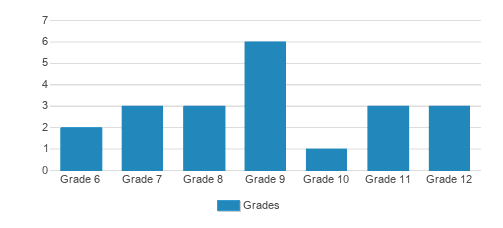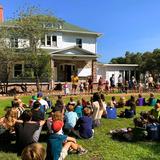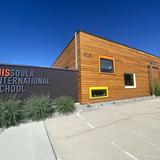Aspire school offers hands-on classes and engaging education in Missoula, MT.
We believe that students should understand the importance of education and should take charge of their own educational path.
Our classes are small and our content is tailored to the level and needs of each individual student.
In addition to more traditional classes, we offer three immersive experiential programs: outdoor & wilderness education, filmmaking and robotics & engineering.
If students choose not to participate in one of these programs, they can craft their own independent study program based on their personal interests. At Aspire, we are a community of learners.
Quick Stats (2025)
- Grades: 9-12
- Enrollment: 28 students
- Yearly Tuition: $9,900
- Acceptance rate: 100%
- Average class size: 10 students
- Application Deadline: None / Rolling
- Source: National Center for Education Statistics (NCES)
School Overview
Student Body
Total Students
28 students
Student Body Type
Co-ed
Students by Grade

Academics and Faculty
Total Classroom Teachers
14 teachers
Student : Teacher Ratio
2:1
National avg.: 13:1
% Faculty w/Advanced Degree
50%
Average Class Size
10 students
Tuition and Acceptance Rate
Admission Deadline
None / Rolling
Yearly Tuition Cost
% on Financial Aid
75%
Average Financial Aid Grant
$4,000
Acceptance Rate
100%
National avg.: 85%
Admissions Director
Annie Graham
School Notes
- Students at Aspire are asked to take charge of their education and their school. They are involved in every aspect of running the school, from serving on the Executive Board, to fundraising, to cleaning classrooms. Students meet weekly to discuss curriculum, school rules and strategic planning. Aspire offers traditional classes that are tailored to the needs and abilities of each student. We also participate in the University of Montana's Early to College program, allowing juniors and seniors to take college level classes online or at the University. In addition to our college and career prep program, students are encouraged to participate in one of our three immersive experiential programs, or to create their own independent study. Students have chosen independent studies in music, art and animation, among other things. Our three immersive experiential programs are designed to give students a more holistic and real world education. Students may participate in all three or may choose one to focus on for the entire school year:
- Outdoor & Wilderness Education: Our outdoor education program helps students to connect with nature, connect with themselves, and connect with our shared past. In our fast paced world, our children almost never have an opportunity to slow down and experience the calm that comes from being immersed in nature. Students in our classes are encouraged to put their cell phones away and acquaint themselves with their inner self. We begin and end our year with nature connection because this connection can help carry us through the stresses of the school year and the difficult realities of being a teenager. Along with a better understanding of self, students who participate in this program gain confidence in survival situations. They might learn fire making, flintknapping, bowmaking, weaving, pottery, felting and other skills that are slowly being forgotten by our culture. Students may participate in this program every year they are at Aspire.
- Filmmaking: Our world communicates through film, so why not develop a deep understanding of this medium as part of your high school experience? The school year begins with a screenwriting class that students can use as part of their English requirement. Students also learn cinematography, in preparation for our December/January shoot. After we film our movies, we get to work on editing. Students use professional grade editing software and learn industry standard editing techniques. Finally, at the end of the year, students use applications like Blender and Adobe After Effects to create visual effects for their movies. Students also score the films and learn foley and sound design as they fine tune the sound for their movies. Students in this program will present their finished projects at the Roxy Theater in May, in a school-wide end-of-year celebration of their work. Student films are an amazing example of teamwork, as different students write, direct, act in, edit and produce each movie.
- Robotics & Engineering:Our school competes in two robotics leagues, one for middle schoolers and one for high schoolers. Robotics competitions help students to think outside the box, develop solutions without a “right” answer, and understand how projects take shape in real world situations. Along the way, students develop business, literacy and STEM skills. Our middle school students compete in the First Lego League, building and programming Lego Mindstorms EV3 robots. In addition to the robot games, our FLL teams complete a research project, developing and presenting an innovative solution to each year’s challenge question. Our FLL teams are made up of 6-8 students in the sixth through eighth grades. Our high school students compete in the First Tech Challenge. These students manage their robotics team like a business, learning important presentation, marketing and planning skills along the way. Each team of 6-8 students builds a robot to compete in two qualifying tournaments and the state championship. FTC students fundraise by volunteering at Learning With Meaning’s “Innovate” summer camps the summer prior to competition.
Source: National Center for Education Statistics (NCES)
Frequently Asked Questions
How much does Aspire High School cost?
Aspire High School's tuition is approximately $9,900 for private students.
What is the acceptance rate of Aspire High School?
The acceptance rate of Aspire High School is 100%, which is higher than the national average of 86%.
When is the application deadline for Aspire High School?
The application deadline for Aspire High School is rolling (applications are reviewed as they are received year-round).
School Reviews
Endorse Aspire High School. Endorsements should be a few sentences in length. Please include any comments on:
- Quality of academic programs, teachers, and facilities
- Availability of music, art, sports and other extracurricular activities
- Academic or athletic awards
Recent Articles

A Parent's Guide To Understanding High School Teaching Methods
This comprehensive guide helps parents navigate the various teaching methods used in today's high school classrooms. By understanding these approaches, you'll be better equipped to support your teen's learning journey, communicate effectively with teachers, and create a complementary learning environment at home.

February 08, 2025
Social Emotional Learning: Education's Hidden SymphonyA musician's perspective on Social Emotional Learning reveals how this educational framework orchestrates success through five essential emotional competencies.

January 24, 2025
A Roadmap For Starting A Private SchoolUse this roadmap as a set of talking points with your trusted mentors and professionals to start the private school of your dreams. You're not alone. Over the years, hundreds of folks like you have had the same dream. From Quintilian to Maria Montessori to Lucy Madeira Wing, visionary educators have established schools to teach according to their beliefs and methodologies.




















